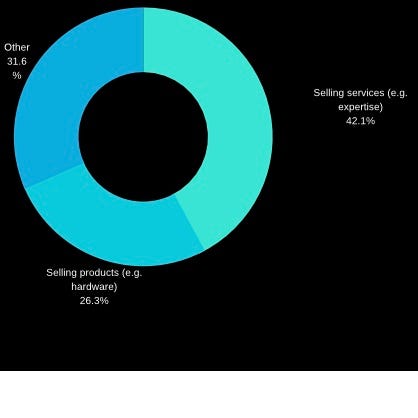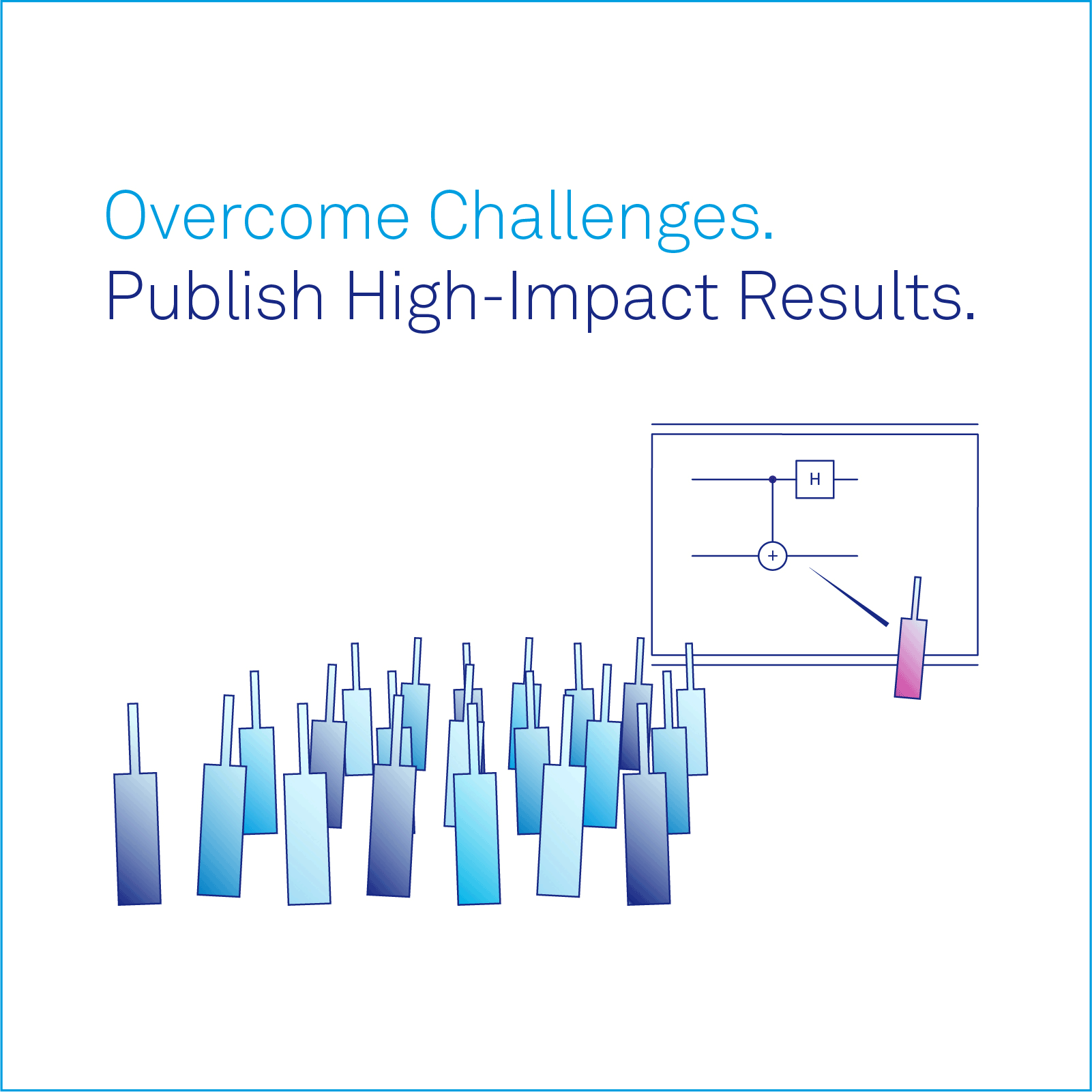
Interesting Data
As with all online news publications, at TQD we adhere to and respect the opinions of our readership. In light of this, and to gain further insight into how each reader feels about the QC industry, we conducted a survey to gauge the overall mood and differing views around key industry milestones.
The data TQD collected, from 35 anonymous respondents from a range of backgrounds — both within the industry and outside of it — returned some very interesting data.
The data was divided into five categories:
- — Milestones
- — Applications
- — Investment
- — Commercialization
- — Other Topics
I will now go over, with as much brevity as possible, some of the most important takeaways from the whole survey.
Milestones: Data Results
Lead Question: What approach to qubits do you think will support the milestone of a Quantum Computer being able to solve a practical that a classical computer cannot?


Of the five approaches to choose from, ‘Superconducting’ came out on top with 31% of respondents believing it would be in this approach that would solve the problems classical computers are not able to. ‘Trapped Ions’ gained second place, with 20.7% of those polled sure it is the best way forward. ‘Topological’ and ‘Photonic’ systems tied with 13.8% of the vote each. In last place was ‘Silicon-based’ technology with 10.3%. ‘Other’ approaches (not designated) also got 10.3%.
Milestones: Key Takeaways
The responses were far-reaching and varied, with a great many of the respondents believing the scaling of qubits would be a massive challenge in the years to come.
Error correction, too, was mentioned as a major problem as the number of qubits becomes exponentially greater over time.
There were also worries over funding: quantum information science (QSI) is a poorly understood technology with too many ‘ifs’ at the moment. With such a paradigm, angel investors, venture capitalists and other third parties with a view to investing in the technology could be put off initially by the big unknown factor of the technology.
Ethical considerations were a concern for respondents as well. Will quantum computers and the underlying technology of quantum information science be used for the good of mankind or will they be used for more malignant applications? These are all prescient worries, especially for those not familiar with the technology.
Applications: Data Results
Lead Question: Which industry do you think is most likely to benefit from early practical Quantum Computers?
The data collated from this question to respondents was ranked in a numerical scale from one to six, one representing ‘likely’ and six ‘unlikely’.
In first place was ‘Chemistry/Pharma’. Examples of where quantum technologies can be useful are with protein folding etc. ‘Security’ ranked second with solutions in cybersecurity. ‘Tech’ placed third with useful applications in such areas as machine learning (ML) and artificial intelligence (AI). In fourth place, quite surprisingly, was ‘Finance’ where quantum technologies can play a crucial role in financial portfolio optimization and management. In fifth spot, ‘Energy’ landed. Last place was ‘Industrial’ uses for quantum technologies. Here, it can have an effect on aerospace design and other things.
Applications: Key Takeaways
A consistent theme from respondents in this section was their trust in quantum technologies changing the landscape in the pharmaceutical sector where many of the technological obstacles are quantum mechanical in nature. They see an early-stage quantum computer having the most effect on this industry, and quite righty, too: as highlighted in the survey, there are a healthy number of players in the sector like Polarisqb, Netramark and ApexQubit. The global health crisis of the COVID-19 pandemic will, no doubt, create more startups sooner, rather than later.
Other areas further down in the ranking, for example, in the energy and industrial sectors, garnered rather more lukewarm responses as to whether quantum technologies will benefit them in the short to mid-term.
Investments: Data Results
Lead Question: What statement do you agree with the most? (Investment refers to government and venture investment).
The data collated to this question came out as 60.7% of respondents believed ‘not enough’, 32.1% a ‘good amount’ while ‘too much’ pulled in 7.1% of the overall voting.
Lead Question: What do you think of the valuations of Quantum Technology companies?
In this section of the survey, 60.7% of respondents believed it was ‘about right’, ‘too low’ achieved 28.6% of the vote while ‘too high’ received 10.7% of the pie.
Lead Question: Have you considered looking at Quantum Computing stocks as a personal investment?

The data obtained from this question was more diverse in opinion but the overall consensus was that 60.7% of respondents considered looking at QC stocks as a personal investment with a resounding ‘yes’. A 17.9% portion of respondents answered they had never heard of it. A slightly lower percentage of people (14.3%) stated they had ‘no time’ to research it. Those who believed it was complete ‘madness’ was 3.6%, while the same percentage of respondents voted ‘other’.
Lead Question: How are you finding seeking investment? (Only includes respondents who answered YES to seeking investment).
‘Other’ amassed an emphatic 53.8% of the vote here which just goes to show the ambiguous nature of the QC industry. The ‘mix’ button got 38.8% of respondents’ votes while ‘good’ shared 7.7% of the pie chart.
Lead Question: Where do you expect your funding to come from?
Always an ominous and worrying subject, answers were rather spread out here but 40% of respondents are sure funding would come from ‘government’. Thirty percent of those polled — may be skeptics — thought money would have to come from ‘bootstrapped/internal’ sources. ‘Specialist VC investor’ got 15% of the overall vote, ‘family office/Angel’ 10% and ‘Traditional VC investor’ only 5%.
Investment: Key Takeaways:
The survey’s general consensus regarding investment in quantum technologies was that two-thirds of respondents agree there’s not enough money being injected into the industry, even though 2020 was the biggest year to date of private investment.
In April, PsiQuantum received $150M in a Series C venture round led by Atomico. In August, Rigetti Computing raised $79M in a Series C round whose leading investor was Bessemer Venture Partners. A month later, in a Series A round led by EQT Ventures, SeeQC obtained $22.4M of capital investment.

In light of the respondents’ mood over investment and the record monies pumped into quantum technologies startups, those surveyed mostly agreed the valuations of the companies were about right.
Another factor identified by respondents’ answers was the number of specialist investors appearing on the scene whose primary focus is to invest their cash in the quantum computing and QIS industries, a good indicator of interest and potential growth. Respondents almost unanimously agree that investors are putting their faith in teams, the overlying technology and most of all, market forces that control the industry.
The majority of those surveyed have considered looking into quantum computing stocks as a personal investment, though quite a significant minority, at just over 17%, didn’t even know such a thing existed or that there were companies that offered such services to clients. This just goes to show how early we are in the narrative of the technology. Currently, there are very few publicly listed stocks with a pure focus on quantum technologies, exceptions being QCI, Archer and the like. Yet, with time, hopefully, this is set to change.
On a negative note, only 8% of respondents answered that they are finding the path to seeking investment ‘good’. Those who responded with ‘mix’ had experienced working with professionals, as well as those who wasted their time. Over half those polled said it was very difficult to explain to investors in more traditional fields what their industry was all about and, because of this ‘brick wall’ as such, many were seeking investment via other avenues, including government grants etc. Early technologies, it is true, can bring out the charlatans, but as the technology matures and becomes a mainstay the serious investors usually appear.
On the subject of where the funding is actually going to come from, 40% of respondents are sure government funding will be the main source of it in the industry. Shockingly, however, only 5% of those polled believe the investment will come from traditional VC investors, which backs up the hypothesis that quantum technologies’ unknown factor could scare many of them off. This could be why more and more specialist VC companies have been and are being founded, as the likes of Quantum Ventures, WorldQuant, Quantum Valley Investments, Quantum1 Group, Quantonation, Summer Capital, and Latent attest to.
Nearly one-third (30%) of respondents are convinced investment will come from sources closer to home via internal methods or by bootstrapping. This is contiguous with the fact quantum technologies are unfamiliar to many investors who are risk-averse. Ten percent maintain high-net-worth individuals (HNWI) and family offices will be the provenance of funds for the industry.
Commercialization: Data Results
Lead Question: How many years will it take for your company to generate revenue in your opinion?
Six years was the average answer from those polled while 25% of respondents claim they are already generating revenue. Twelve percent of those surveyed believe revenue streams are ten or more years away.
Lead Question: How do you expect to generate revenue?

More than forty percent of respondents (42.1%) suppose they will generate revenue by selling services and expertise. For 26.3% of those polled, selling products, ie, in hardware will be a reliable source of revenue. Just over thirty percent of respondents are of the opinion ‘other’ areas will likely bring revenue streams.
Commercialization: Key Takeaways:
Currently, many quantum technology companies are in the R&D stage. This is particularly true for those that develop hardware to eventually build full-stack quantum computers.
A portion of these companies is already generating revenue from the market. One example is in refrigeration units for qubits that, because of their high volatility, need to be kept at very low temperatures to sustain optimal working efficiency.
As was expected from those polled, early revenue streams will come from the dissemination and knowledge and expertise through consulting and other services like subscription software models. Consultancy firms, too, like Chicago Quantum, H-Bar Consultants and Entanglement Partners, prove there is a need for their insight and expert guidance in the market.

Yet respondents are also sure revenue streams will come from other sources, for instance, by accessing quantum computers through online platforms and from the development of algorithms.
People in Quantum Technologies: Data Results
This vote was quite unanimous from multiple questions, with 80% of respondents believing it is ‘hard or very hard’ to hire the right people.
On a scale of 1–5 — one being the worst and five the best — those polled averaged a 2.75 rating in regard to the quantum technologies industry being good regarding gender diversity.
When it comes to racial diversity, respondents’ scored the industry an average of 2.80.
People in Quantum Technologies: Key Takeaways:
As is always the case with nascent technologies, hiring the right people, with the right qualifications and the right attitude is harder than it looks. Startups like Qureca and others (TQD’s job board) are providing companies and other startups with bespoke recruitment advice and services, and as the quantum technologies industry grows, this sector is only set to grow exponentially.

Most polled about the gender and racial diversity issue sat on the fence. Does this prove the topic is a contentious one or that people are too afraid to speak out about it? Like lots of other industries where STEM recruitment is crucial, racial representation and gender balance have been somewhat lacking as far back as the industries have been in operation. With the Black Lives Matter movement and women’s and ethnic minorities’ advocacy groups around the globe speaking out and gaining traction, this problem could soon be addressed and rebalanced.
Quantum Technologies Ethics: Key Takeaways (no statistical data, respondents answered the question)
Lead Question: What example use cases represent ethical or practical threats to society?
On the whole, the general consensus of those polled lends the mood that many industrial stakeholders recognize the potential power quantum computing could bring to an organization that develops it. Because of this, some in the industry have been looking to its implications from the risks around the unequal distribution of computational power, in intellectual property rights and in applications — both for good and bad — that could allow users to break traditional methods of encryption. These worries have set about more people within the industry steering towards how quantum ethics could assist QIS as it becomes more mainstream.
Just like with classical computers and other forms of technology, in the wrong hands, there is a chance they could be used for odious purposes. The respondents of the survey, aware of quantum technology’s rise, believe considerations need to be put in place now while the technology is at its developmental stage.
Quantum Technologies Misconceptions: Takeaways (no statistical data, respondents commented on a statement)
Lead Statement: Name one misunderstanding in the industry you would like to clear up
The general view of respondents here was that many companies and startups are trying too hard to oversell the potential of applications in quantum technology by selling something now that will work in five to ten years’ time. Though not snake oil merchants, there does seem to be the mood that some of the companies on the market are trying to overhype themselves and their products by promising things that may be impossible to accomplish within a short-term time frame.
Other worries they thought important were qubit number and quantum volume where there is no general consensus to universal measurements by researchers and industry experts alike.
Admiration and Scepticism: Takeaways
Lead Questions: Which Quantum Technology company do you most admire and why? Which Quantum Technology company do you think should be treated with skepticism and why?
Probably one of the most interesting areas of the survey, respondents here held admiration for IBM and Google, which is of no surprise really. IBM was mentioned the most by those polled mainly due to its online resources and ease of accessibility. Google, on the other hand, is respected for its claim back in 2019 of Quantum Supremacy.
Other notable mentions were for the great work being done by Cambridge Quantum Computing, Xanadu, PsiQuantum, and Oxford Quantum Circuits.

Nevertheless, where there is light there is darkness, and this was reflected in respondents’ skepticism of other players in the industry. TQD would like to give out a big sigh of relief, as there was no company which was consistently singled out as requiring a skeptical eye, though those polled did identify D-Wave Systems’ superconducting adiabatic quantum computer as a subject for skepticism, though they did also state the Canadian company continues to do amazing work in research and has filed many exciting patents.
I hope you enjoyed reading this. As the quantum technologies industry grows, TQD is sure to grow with it, bringing you the most up-to-date news, views and data that will not only benefit you as a reader but your organization, too.
If you found this article to be informative, you can explore more current quantum news here, exclusives, interviews, and podcasts.


















